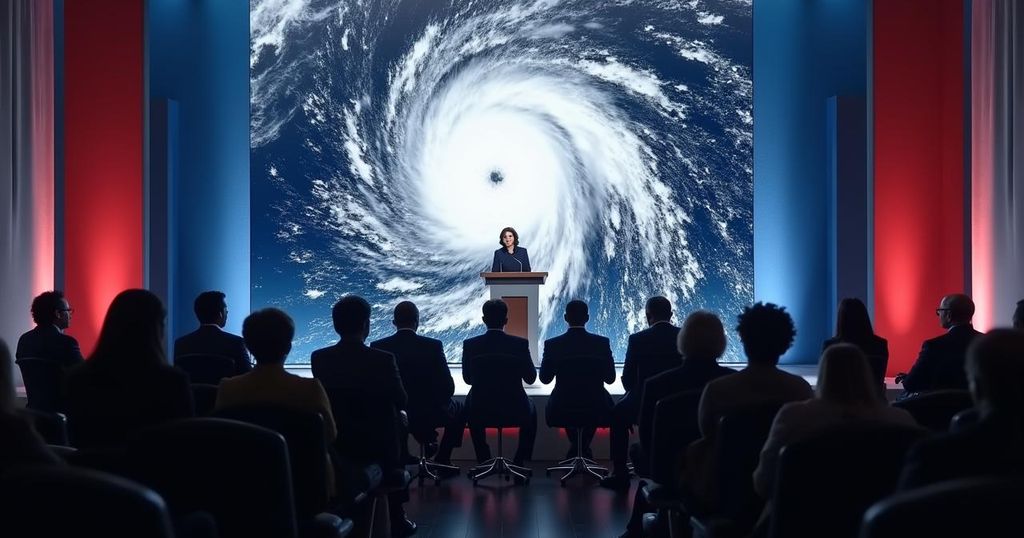Hurricane Helene Highlights Climate Change Debate During Vice Presidential Debate

Hurricane Helene’s devastation across multiple states has raised urgent questions about climate change in the recent vice presidential debate. While Senator Vance downplayed human contributions to climate change and emphasized domestic manufacturing, Governor Walz applauded the Biden administration’s climate initiatives, particularly the Inflation Reduction Act, asserting the importance of balancing energy production and environmental responsibility.
During this week, Hurricane Helene made landfall, wreaking havoc across several states, including Florida, Georgia, South Carolina, North Carolina, Tennessee, and Virginia. The storm has resulted in over 160 fatalities, thousands of individuals displaced, and extensive damage to both homes and infrastructure. The situation remains dire, with more than 600 individuals reported missing, while search and rescue, along with disaster relief operations, persist. The urgency of this catastrophic event prompted a discussion regarding climate change within the vice presidential debate held on Tuesday evening. Moderator Norah O’Donnell noted that a significant consensus among scientists indicates that global warming is occurring at an extraordinary pace, resulting in an increase in the frequency and intensity of hurricanes. Both O’Donnell and another moderator, Margaret Brennan, linked the severe consequences of Hurricane Helene to climate change. A preliminary analysis conducted by scientists at Lawrence Berkeley National Laboratory suggested that climate change may have intensified rainfall in the southeastern United States by as much as 50%. Although this analysis remains unpeer-reviewed, it employed methodologies established in prior peer-reviewed research. In response to an inquiry about the responsibility of a prospective Trump administration in addressing climate change, Ohio Senator J. D. Vance, currently aligned with former President Donald Trump, recognized that many citizens are understandably concerned about the unpredictable weather patterns. However, he expressed skepticism regarding the theory that human-induced carbon emissions are the primary drivers of climate change. He proposed that even if such emissions were contributing factors, a viable approach to mitigate these would be to reshore manufacturing and enhance domestic natural gas production. Numerous scientific investigations have repeatedly linked the phenomenon of climate change to rising carbon dioxide levels in the atmosphere. Senator Vance asserted his desire for a cleaner and safer environment alongside Trump. Conversely, Minnesota Governor Tim Walz, the running mate of Vice President Kamala Harris, highlighted the importance of the Inflation Reduction Act (IRA) enacted by the Biden-Harris administration. Walz characterized the IRA as the most substantial climate investment in history, which allocates billions to combat climate change and foster domestic green energy initiatives. He emphasized that under a Harris administration, it is feasible to sustain oil and gas production while simultaneously expanding clean energy initiatives. According to Walz, the belief that the nation must choose between job creation and environmental responsibility is misguided. Governor Walz reminded the audience that the United States currently experiences the highest levels of oil and gas production in its history, countering the narrative that Harris is seeking a moratorium on fossil fuel utilization or production. Additionally, Walz criticized former President Trump for dismissing the climate crisis as a hoax and favoring the oil and gas sectors through supportive policies linked to campaign financing. Furthermore, he asserted, “My farmers know that climate change is real.” When asked if he concurred with Trump regarding climate change being a hoax, Vance refrained from providing a direct answer and instead pointed out that manufacturing solar panels in China contributes to a less clean economy. Walz responded by emphasizing the need for intelligence in energy policy, declaring, “We can be smarter about that, and an all-above energy policy is exactly what [Harris is] doing, creating those jobs right here.”
The occurrence of Hurricane Helene has accentuated the ongoing discussions surrounding climate change and its implications on weather patterns. Scientific consensus has increasingly acknowledged human activities as contributors to climate change, which, in turn, leads to severe environmental events including hurricanes. This situation has sparked debates on policy measures that governments must take to mitigate the effects of climate change and bolster resilience against future disasters.
The recent effects of Hurricane Helene have thrust climate change into the forefront of political discourse, particularly during the vice presidential debate. While Senator Vance provided a skeptical perspective regarding human-induced climate change, Governor Walz emphasized the significant steps being taken under the Biden-Harris administration to address the climate crisis through initiatives like the Inflation Reduction Act. The necessity for an informed and practical approach towards environmental policy continues to be a pertinent topic following such devastating natural disasters.
Original Source: eos.org






